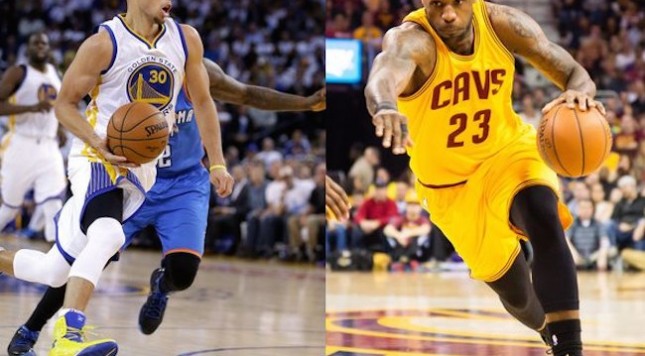The Cleveland Cavaliers began this long season in late October with the hope that after losing the 2015 NBA Finals, they could eclipse the Golden State Warriors in the league’s pecking order.
On Monday, January 18, they realized that was not likely to happen… unless the Warriors failed to make the 2016 Finals, felled by a Western Conference opponent.
When the Oklahoma City Thunder failed to close out the Warriors in the Western Conference Finals, the Cavs lost home-court advantage in these Finals. More important is the fact that they lost a matchup they could more easily handle. With the Warriors — authors of a 132-98 evisceration in Cleveland four and a half months ago — returning to the Finals, the Cavs know they’ll need their very best series to prevail. Even a few ounces of poorly-timed mediocrity will doom Cleveland to second place.
Yet, isn’t that part of the point? The Cavs hoped they’d become better than the Warriors after last year’s Finals, but they could not control or affect how well the Dubs would become this season. Cleveland has not failed to improve; Golden State has merely succeeded in growing from its championship season.
Because of that growth, the Cavaliers are unquestioned underdogs in these Finals. They’re clear underdogs even though Kevin Love and Kyrie Irving are healthy this time. They’re clear underdogs even though they enter this series with five full days of rest, the Warriors only two. They’re clear underdogs even though they received full weeks of rest between their first two playoff series, and then their second and third series as well. The Warriors gained half-weeks of rest between series before the Western Conference Finals.
You can appreciate the no-win situation the Cavaliers inhabit. The series, logistically, is set up well for them. With two days between almost every game, except for Games 3 and 4, LeBron James can play workhorse-level minutes (44 or more) instead of needing to be restrained near 40 or 41. Yet, the matchup is so difficult for the Cavs that if they lose the Finals in six games or fewer — in other words, without failing to do better than the 2015 team — they will get criticized.
They shouldn’t be… but they will be.
If Tyronn Lue can’t win more Finals games than David Blatt did, he will be criticized.
He shouldn’t be… but he will be.
If Cleveland can’t at least force a Game 7, general manager David Griffin will catch heat for firing David Blatt and inserting Lue in the head coach’s chair. The January coaching change occurred a few days after the 34-point drubbing the Dubs laid on the Cavs, so the purpose of the move could not have been any clearer: The immediate goal was to change the style of play on the team (faster, more threes, more offense). The longer-term goal was to make the locker room a happy place again (it hadn’t been).
The ultimate goal? Beat the Warriors.
Yet, what have two months of Eastern Conference playoff basketball shown us about the Cavs, or proved about the Cavs, in relationship to Golden State? No, not that Cleveland doesn’t measure up; that’s unfair to say before a single Finals game has begun.
What has Eastern Conference ball shown us about the Cavs’ relationship to the Warriors? The answer is that there is no answer. How can anything Cleveland has done in this postseason — good or bad — fully prepare us for a series against a team which absorbed the Oklahoma City Thunder’s best defensive effort in the West Finals?
The Cavs, during the regular season, were criticized from a lot of angles, often with a severity which seemed to suggest the team was in at least some trouble in the Eastern Conference. To that extent, Cleveland was saddled with criticisms which never squared with the reality of the team’s situation. Cleveland was always the class of the East; it was always going to be the class of the East.
Now, though, the Cavs inhabit a very different situation. They go from being the obvious favorite to the just-as-obvious underdog. Criticism about their readiness to return to the Finals — winning the East — was never reasonable. Criticism about their ability to win the Finals against a superior opponent will likely become overplayed and unreasonable as well, just from a different angle. Cleveland was criticized during a season in which it never lost control of the Eastern Conference. Now, the Cavs could be buried by the national press for losing a series which they might never be able to control.
Athletes — either in a team or individual context — fundamentally lack control over the outcome if the opponent has the better talent and the greater collection of skills. Cleveland could play a perfectly good series and yet lose, because Golden State has the better talent. Yet, you know the criticism will flow if the Cavs don’t avenge the 2015 Finals. In some ways, they have set themselves up for this, but in other ways, the weakness of the East and the greatness of the Warriors have made it hard for Cleveland to control its own fate.
The Cavs are in an impossible position as the 2016 NBA Finals begin. All I can say in closing is to be reasonable and modest in your criticism of this team… after a regular season in which a lot of people tore at the Cavs for reasons which were both wrong and unrealistic.

